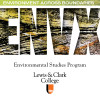main content Finding Paths
ENVS alum, Julian Brastow ’22, describes his initial job search after graduating from LC.

I started applying for jobs en masse, hoping I would find something that fell neatly at the intersection of these interests. I cast a wide net, and most of the jobs I applied for only pertained to one of them. Most were summer seasonal jobs with the US Forest Service and National Park Service, because I knew above all else that I wanted to spend the following summer working outside, ideally somewhere within the nation’s public lands. It may be obvious, but I think that process showed me the importance of not getting caught up in finding the “perfect job” right away.
I wasn’t a student anymore, but LC found its way into this process. I got an email from the College Outdoors mailing list about an opportunity to spend the summer working for a nonprofit doing wilderness trail maintenance in central Idaho. I got the job and it turned into one of the best summers of my life. I felt lucky to have found something that was fulfilling and that I felt like I could come back to for the following summers.
I also felt lucky to be doing something that pertained to my ENVS thesis, in which I explored the multiple-use management policy in national forests. While this policy involves managing forests to be used in a variety of ways by the public and industry, the work I was doing in Idaho solely took place in designated wilderness areas, where the only “use” involves limited recreation and hunting. By spending a summer immersed in the largest contiguous wilderness in the Lower 48, I was able to foster a deep appreciation of this special designation of public land. It also helped me recognize that there is intrinsic value in knowing that wilderness simply exists, and I believe this is a “use” in of itself.
Near the beginning of that summer I had no doubt I would return to the same organization or a similar one to do more work in wilderness the following year. However, during much of the summer I was living at a ranger station and met numerous Forest Service employees, many of them wildland firefighters. Like me, they were spending their whole summer outside, engaging in fire suppression and general forest management activities. They were also making a lot more money than I was, and I won’t lie about that being a factor in me ending up applying to wildland firefighter jobs with the Forest Service that fall.
I ended up moving to Bend to live with some LC friends, and I got offered a job there working on a Forest Service fire crew last summer. After accepting a permanent seasonal position starting in a couple weeks, I again feel like I’ve found something I can keep doing for multiple years, as it excites me to be a part of wildland fire and forest management. I learned a ton in my first season and am eager to continue that process this year, and I’m excited to explore the different directions I can take this career path.
Environmental Studies is located in room 104 of Albany Quadrangle on the Undergraduate Campus.
MSC: 62
email envs@lclark.edu
voice 503-768-7790
Symposium Advisor Jim Proctor
Environmental Studies
Lewis & Clark
615 S. Palatine Hill Road
Portland OR 97219
More Stories

Farming, Oceanography, and the Arctic
Rylie Neely ’20 shares how she continued to use her ENVS education during an unplanned career pause due to Covid.
2025 Project Descriptions for the Rogers Program
Summer science research opportunities

Place-Based Learning
From Trash to Treasure: Creating Art From Waste
Cara Tomlinson’s Art and Ecology class uses waste materials from around Portland to create beautiful and meaningful works of art. This course offers a fresh approach to creative practice, merging art and ecology to help students respond to the climate crisis, explore the agency of materials, and build connections to place.

Climate Justice
Uncovering the Hidden Toll of Natural Disasters
Rachel Young BA ’11 recently published groundbreaking research in the journal Nature on the long-term health impact of tropical cyclones. The article is part of her growing scholarship on the quantifiable social effects of climate change and natural hazards.
